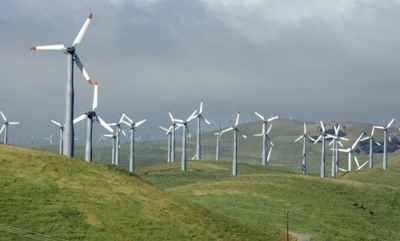£1.3m grant awarded to turbine blade recycling project
Funding has been allocated by the UK Government to a £2 million pilot scheme developing the nation’s ‘first wind blade turbine recycling plant’.
Convened by a consortium headed by Aker Offshore Wind – and additionally consisting of Composites UK; Nottingham University; SUEZ; GRP Solutions; and Cubis – the three-year project will commercialise the method of separating the glass-fibre and resin components of turbine blades developed by the University of Strathclyde’s Advanced Composites Group and Lightweight Manufacturing Centre. The obtained glass fibre element is then to be reprocessed, moulded and redistributed to other industries, including the motor trade and the construction sector.
 The funding comes largely from Innovate UK, which is investing £1.3 million into the project – Aker Offshore Wind is to contribute over £500,000 in order to make up the remaining amount required to bring the project to reality.
The funding comes largely from Innovate UK, which is investing £1.3 million into the project – Aker Offshore Wind is to contribute over £500,000 in order to make up the remaining amount required to bring the project to reality.
Turbine blades, at present, are either sent to landfill or to energy from waste (EfW) plants when they reach the end of their lifespan. The waste generated by these blades is currently expected to amount to approximately 2 million tonnes globally by 2050, with the UK’s rate of composite waste already exceeding 100,000 tonnes annually.
In order to combat this issue, the consortium has lent its support to WindEurope’s call for ‘a Europe-wide landfill ban on decommissioned wind turbine blades by 2025’, with the blade recycling project, according to Aker Offshore Wind, a ‘crucial step towards setting a new standard for the industry.’
Sian Lloyd-Rees, Managing Director of Aker Offshore Wind UK, commented: “This project will be an important piece in our drive to accelerate the move to net zero waste and emissions and demonstrates Aker Offshore Wind’s commitment to sustainability across the lifecycle of a wind project; all while investing in Scotland and the UK to build a more sustainable future for decades to come.
“At COP26 we heard the urgent call for action and this planned innovation will answer that call to secure tangible solutions for circular business models. The Innovate UK grant will make blade recycling a firm reality, building on the expertise of the researchers at Strathclyde University and our decades of experience at Aker Offshore Wind to create a commercially-viable green solution.”
Malcolm Forsyth, Sustainability Manager at Composites UK and overall project leader, said: “This project is a vital step towards establishing a commercial recycling route for composite materials in the UK and beyond, covering both wind turbine blades and several other applications in the construction and transport sectors.
“Composite materials combining glass-fibre and polymer resin systems, have a huge role to play in enabling the UK economy to transition to net zero and we need effective recycling at end of life to ensure that composite materials achieve high levels of circularity in future.
“Composites UK and all the project partners are very excited that this break-through technology scale-up project has now been funded by the UK government and will make the recycling of glass-fibre composites a commercial reality in the UK in the years to come.”
Professor Sir Jim McDonald, Principal at the University of Strathclyde, said: “Wind Energy is a key component of the transition to net zero and it is essential that the technology and materials that provide renewable energy are as sustainable as they can be.
“As we have seen at COP26 in Glasgow, a global move to renewable, sustainable sources of energy will help to make some of the biggest advances in the quest to tackle climate change. At Strathclyde, we have developed novel processes for recycling and reusing wind turbine blades, which will help to reduce waste in the renewables sector and wider industry.
“This project, and our partnership with Aker Offshore Wind, are examples of the research and industrial engagement which has placed Strathclyde at the forefront of innovation in renewable energy and composites sustainability.”






